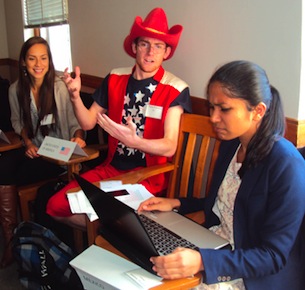By Steve Hockensmith, UC Berkeley News Center
UC Berkeley announced recently that it had reduced its carbon emissions to 1990 levels two years earlier than expected, showing how quickly progress can be made – at least at the local level – in addressing climate change. Unfortunately, getting the world community to take significant action has proven far trickier, and a recent exercise in a Berkeley class demonstrates why.
Kate O’Neill, an associate professor in the Department of Environmental Science, Policy, and Management, has been teaching international environmental politics since 1999. This year, she decided to make a simulated international climate-change conference the centerpiece of her fall course. Each of her 125 students was assigned one of 26 nations, chosen to represent a range of political and economic interests, from superpowers to some of the world’s smallest, poorest countries. The students then spent the semester studying and writing about their assigned nation’s population, economy, politics and vulnerability to climate change.
All that preparation was put to use last month, when the students were divided into four groups, each of which held its own mock treaty negotiations.
“It gave them a chance to really understand why it’s so difficult for countries to agree on climate change and what to do about it,” O’Neill says. “Plus it’s much more fun than having to write a long final essay.”

Students Marina Shimoyama (left), Daniel Norton Luna and Radhika Kannan represent Canada, the United States and Mexico in a simulated climate-change negotiation session. (Steve Hockensmith photo)
“It took the core concepts of the course and really made the students play them out,” adds one of O’Neill’s graduate-student instructors, Manisha Anantharaman, who served as moderator for one of the negotiation groups. “I think that’s really going to help them internalize what Kate’s been talking about this semester.”
There were opening addresses, motions, votes, impromptu coalitions and factions, impassioned pleas for action – and even those old political standbys, grandstanding and backpedaling. All of which was also on display thousands of miles away in Warsaw, where the real United Nations was simultaneously hosting its own global summit on climate change.
Not only did that conference fail to generate any real breakthroughs, it was more notable for its disappointments. Japan announced it was downgrading its emission-reduction goals significantly due to the near-meltdown at Fukushima in 2011, which forced the country to begin importing more coal and natural gas. Australia and China also seemed to back away from emission-reduction commitments, and both a bloc of developing nations and a group of non-governmental organizations walked out of the conference in protest.
Trust, but empathize
Junior Reza Abedi says his experience at O’Neill’s simulation helped him understand why such setbacks happen.
“This class was my first exposure to the politics side of energy issues, and it really opened my eyes to the institutional problems of addressing climate change,” says the economics major. “I think what I came out with more than anything is an understanding of why we don’t see the negotiating outcomes we would hope for. I don’t think there’s enough trust between countries to uphold their promises to take action.”
Read the complete story at the source.
